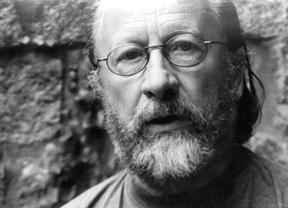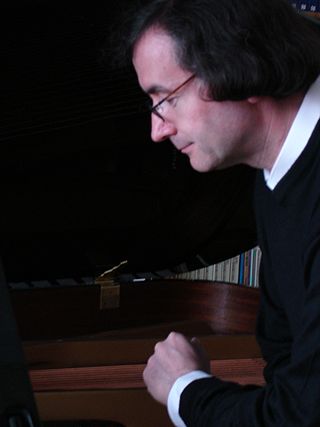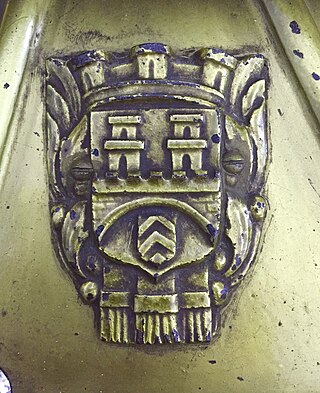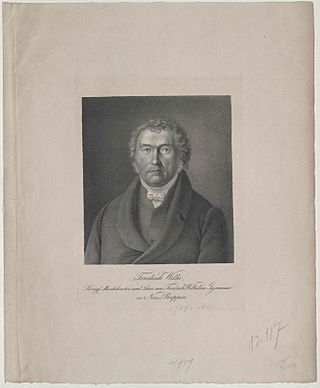
Karl Gottfried Brunotte (born 2 June 1958 in Frankfurt) is a German composer and music philosopher, particularly noted for his contributions to church music.

Karl Gottfried Brunotte (born 2 June 1958 in Frankfurt) is a German composer and music philosopher, particularly noted for his contributions to church music.
Brunotte studied music sociology, music psychology, ancient languages, aesthetics, piano, organ, harpsichord, violin, viola, recorder, singing, conducting, and musical composition, as well as electronic music, with (amongst others) Heinz Werner Zimmermann, Lothar Hoffmann-Erbrecht, Hans Peter Haller, Gottfried Michael Koenig, and Karlheinz Stockhausen. [1] [2]
From 1974 to 1977 he held the position of Cantor at the Christuskirche in Bad Homburg, where he later was a lecturer at the Hochschule für Musik und darstellende Kunst (1982–1985). [3] From 1980 to 1986 he was Senior Lecturer at the International Vacation Courses for New Music in Darmstadt, and a member of the Darmstadt Institute for Music and Musical Education. In the 1984–85 year he was Rapporteur für Ernste Musik at the Landsmusikrat Hessen. [2] Once a Jesuit novice, in 1987 he joined the Church of Jesus Christ of Latter-day Saints. [3]
Since 1993 he has worked at the University of Frankfurt in the Institut für Musikwissenschaft und Musikpädagogik, as well as at the Fachhochschule Frankfurt für elektronische Musik. [3]
He has composed nearly 300 pieces for the most diverse forces. [1]
In addition to his compositional and teaching activities, Brunotte has been involved for decades in academic administration. In May 2012 he stood unsuccessfully against the incumbent, Hans-Eberhard Schurk, in the election for President of the Augsburg University of Applied Sciences. [4] [5]
Dieter Schnebel was a German composer, theologian and musicologist. He composed orchestral music, chamber music, vocal music and stage works. From 1976 until his retirement in 1995, Schnebel served as professor of experimental music at the Hochschule der Künste, Berlin.
Gottfried Michael Koenig was a German-Dutch composer.
Herbert Eimert was a German music theorist, musicologist, journalist, music critic, editor, radio producer, and composer.
The Cecilian Movement for church music reform began in Germany in the second half of the 1800s as a reaction to the liberalization of the Enlightenment.
York Höller is a German composer and professor of composition at the Hochschule für Musik Köln.

Georg Katzer was a German composer and teacher. The last master student of Hanns Eisler, he composed music in many genres, including works for the stage. Katzer was one of the pioneers of electronic new music in the German Democratic Republic and the founder of the first electronic-music studio in the GDR. He held leading positions in music organisations, first in the East, then in the united Germany, and received many awards, including the Art Prize of the German Democratic Republic, the National Prize of the German Democratic Republic, the Order of Merit of the Federal Republic of Germany, and the German Music Authors' Prize.
Church musician (Kirchenmusiker) is a music profession in Germany.

Karl Ferdinand Becker, was a German writer on music, composer and an organist.

Oktophonie (Octophony) is a 1991 octophonic electronic-music composition by Karlheinz Stockhausen. A component layer of act 2 of the opera Dienstag aus Licht, it may also be performed as an independent composition. It has a duration of 69 minutes.

Schiersteiner Kantorei is a German concert choir, founded in 1962 at the Christophoruskirche in Wiesbaden-Schierstein. The choir performs regularly in the Marktkirche, Wiesbaden, and in Eberbach Abbey. It is known internationally through its tours and recordings. The choir was awarded the Culture Prize of the City of Wiesbaden in 1990.
Günther Kaunzinger is a German organist and pianist.

Ludger Stühlmeyer is a German cantor, organist, composer, docent and musicologist.
Rolf Riehm is a German composer who wrote stage and orchestral works as well as music for ensembles and solo instruments. He began as an oboist and music teacher and was later a professor of music theory at the Hochschule für Musik und Darstellende Kunst Frankfurt am Main for several years.

Th. Mann & Co. was a German piano factory, existing in Bielefeld, Prussian Province of Westphalia, from 1836 until 1942, as well as instrument shop for pianos and harmoniums with temporary branch offices in Gütersloh, Herford, Detmold, Rinteln and Paderborn.
Klaus Zoephel was a German composer and conductor.
Hans Huchzermeyer is a German doctor and musicologist.

Christian Friedrich Gottlob Wilke was a German organist, composer, music teacher, music writer and organ revisor.

Kurt Fiebig was a German composer, church musician and professor at the Hochschule für Musik und Theater Hamburg.
Friedrich Gustav Schilling was a German musicologist, editor and lexicographer.
Alfred Stier was a German composer and music director of the Evangelical-Lutheran Church of Saxony.
Footnotes